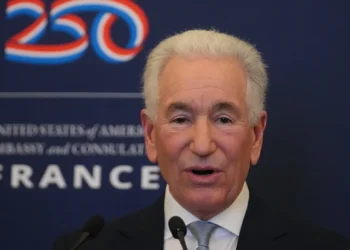DAMASCUS (Realist English). Since the collapse of Bashar al-Assad’s regime last December, a new nightly ritual has taken hold on the streets of Damascus and in the surrounding countryside: figures wandering with metal detectors, shovels, and folded maps, searching for gold rumored to lie beneath centuries of bloodstained soil.
What was once a forbidden and dangerous pursuit under the Assad government — digging for treasure was illegal, tightly surveilled, and potentially fatal — has now become an open obsession. Spurred by economic desperation, fading taboos, and a cultural mythology rooted in Syria’s ancient past, gold hunting is no longer a secret.
“In the old days, you couldn’t dream of doing this on a moonlit night,” said Abu Wael, a 67-year-old self-described veteran treasure hunter. “Now people do it in broad daylight.”
The new economy of gold dreams
Since January, multiple stores have opened in Damascus selling metal detectors, including high-end models priced up to $10,000. Their windows are plastered with Syrian flags, images of gold coins, and men wielding the latest detection gear. Some retailers offer child-sized detectors in green and pink, advertising them as tools for adventure, not just fortune.
“People have always believed in treasure,” said one store owner, who requested anonymity. “But now they’re finally free to look for it. We’ve had people fly in from Lebanon and Iraq just to buy detectors.”
Treasure fever is rooted in more than just folklore. Syria, with its layers of Roman, Byzantine, Ottoman, and Islamic civilization, is home to hundreds of thousands of archaeological sites. Many Syrians believe they are literally living atop buried history.
“There’s hardly a home that doesn’t have a legend about someone’s uncle finding a jar of gold coins,” said Dr. Amr al-Azm, a former Syrian antiquities official now teaching in the U.S. “It’s part of our regional mythology.”
The collapse of the Assad regime has also collapsed the rule of law. Digging is still technically illegal, a Syrian government media official told Realist English, “but we turn a blind eye — we don’t have the capacity to patrol everything.”
Old legends, new markets
The most popular target is the area around the Hejaz railway, a century-old Ottoman-era line that once connected Damascus to Medina. Rumors abound that retreating Ottoman forces in 1917 buried gold along the route — rumors that vendors and treasure hunters alike have used to fuel demand for high-end detectors, including waterproof models for scuba divers.
On Facebook and regional classifieds, sellers in the UAE, Jordan, and Lebanon offer devices allegedly calibrated for Syria’s basaltic terrain. Some boast 3D imaging software that displays buried objects on screen and estimates their depth. “Perfect for Syrian soil,” one post reads.
Some dealers, however, warn that most finds are fake. “The market is flooded with counterfeit Ottoman and Roman coins,” said al-Azm. “People are desperate, and imagination runs wild.”
But not all is imagined. Al-Azm confirmed that since Assad’s fall, he’s seen real antiquities offered on the black market — “including museum-grade pieces looted from private homes or state collections.”
The trafficking of looted Syrian treasures dates back to the early war years. At least 300,000 artefacts were hidden in secret storage by officials in 2011 to avoid their capture by militias. Many have since disappeared. Some, experts say, surfaced in Turkish bazaars or in the homes of the ultra-wealthy abroad.
Treasure and trauma
Abu Wael claims he has never found treasure in 40 years of digging — though he says he came close. Once, after weeks of decoding symbols carved into a wall, he returned to his excavation site to find it already dug up. “The villagers told me a group came in the night and found a chest of gold,” he said. “Maybe it’s better that way. We have a saying: whoever finds gold, loses his mind.”
The trade is not without peril. Some diggers have been attacked by villagers or rival treasure hunters, who see them as intruders or seek to seize any potential find. “We don’t go out alone anymore,” one Damascus-based hunter said.
Videos and photos circulate on Telegram and WhatsApp channels — allegedly showing brittle Hebrew scrolls, jars of coins, or ancient keys pulled from the earth. One hunter sent Abu Wael images of a gold-lettered scroll, claiming it was found in a Jewish cemetery.
Also thriving in this environment are so-called mystics, who charge desperate Syrians to “read” markings, scrolls, or energy lines said to guide seekers to hidden treasure. “They take your money and show you nothing,” Abu Wael scoffed. “The most famous one calls himself the Red Sheikh.”
Syria’s gold fever is more than a post-conflict curiosity — it is a desperate response to economic collapse, social disintegration, and the unburied trauma of war. For many Syrians, the dream of treasure is a substitute for the future they lost. But amid rising scams, lawlessness, and the looting of heritage, the question is no longer whether gold lies buried in the soil — but whether anything of Syria’s past can remain untouched as its people dig, both literally and metaphorically, for hope.


















